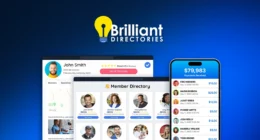Content marketing software provides centralized platforms that streamline content planning, creation, and distribution through automated workflows and collaboration tools. These platforms typically include features like editorial calendars, SEO optimization, multi-channel publishing, and performance analytics. Leading solutions like HubSpot, Semrush, and Contently help teams boost efficiency and measure ROI. Companies utilizing content marketing tools see up to 7.8x higher revenue growth and 2200% ROI. The right software stack can transform a basic content strategy into a powerful revenue generator.
Quick Overview
- Content marketing software centralizes planning, creation, distribution, and analytics tools in one platform for seamless campaign management.
- Leading platforms like HubSpot and Semrush combine CRM, SEO optimization, and comprehensive marketing features for better results.
- Automation features streamline workflow, reduce manual tasks, and help teams collaborate more efficiently on content projects.
- Built-in analytics track performance metrics and ROI, enabling data-driven decisions to improve content strategy.
- Companies using content marketing software see significantly higher revenue growth through improved blogging and content distribution.
Unlocking the Power of Content Marketing Software

Content marketing software revolutionizes how businesses create, manage, and distribute their digital content across multiple channels. Through a centralized platform, teams can collaborate seamlessly while maintaining visibility into production schedules and campaign timelines.
The software’s power lies in its ability to streamline operations and boost efficiency through automation. By reducing time spent on repetitive tasks, teams can focus on strategic initiatives that drive results. Today’s outdated content systems are causing significant challenges in managing and repurposing existing assets effectively.
The platform’s analytics features provide valuable insights into content performance, audience preferences, and channel effectiveness, enabling data-driven decisions.
Companies using content marketing software see significant benefits, including 7.8x higher year-over-year revenue growth and 97% more website links through blogging.
The technology connects with existing content repositories and marketing systems, creating a unified ecosystem that enhances productivity and maximizes marketing impact.
Essential Features for Content Marketing Success
While selecting the right software platform is essential, successful content marketing hinges on having access to specific key features that drive results.
Modern content marketing software needs five core capabilities to deliver maximum value:
- Content planning tools that include editorial calendars, persona targeting, and strategic workflow management
- Creation features with AI assistance, SEO optimization, and ready-to-use templates
- Distribution capabilities that enable multi-channel publishing and automated scheduling
- Analytics functions for tracking performance metrics and measuring ROI
- Collaboration tools that streamline team communication and content approval
These key features work together to create a thorough system that supports every stage of the content marketing process.
From initial brainstorming to final performance analysis, each component plays an essential role in achieving marketing objectives efficiently and effectively.
An intuitive user-friendly interface ensures teams can quickly learn and effectively utilize all available features without extensive training.
Leading Platforms Transforming Content Strategy

Modern marketers seeking to implement effective content strategies have numerous powerful platforms at their disposal.
Leading solutions like Hubspot combine CRM capabilities with robust marketing features, while Semrush offers extensive SEO and content marketing tools.
For content creation and distribution, platforms such as StoryChief and Contently enable seamless planning and execution. These tools excel at content lifecycle management through integrated planning, creation, and distribution features.
AI-powered tools are revolutionizing content development, with Jasper providing customizable writing assistance and Synthesia transforming video creation.
Performance tracking remains essential, with Google Analytics and BuzzSumo offering detailed insights into content effectiveness.
Collaboration tools like Monday.com and Notion streamline workflow management, while specialized platforms such as ContentStudio and Outbrain optimize distribution across multiple channels.
These platforms collectively empower marketers to create, manage, and measure content more effectively than ever before.
Maximizing ROI With Content Marketing Tools
Maximizing return on investment from content marketing tools requires a strategic combination of clear goal-setting, data analysis, and process enhancement. Companies that leverage automation and data-driven insights consistently achieve higher ROI from their content initiatives. The implementation of thorough measurement systems enables organizations to track performance and adjust strategies accordingly. Content marketing efforts typically generate a 2200% ROI when properly optimized for search engines, making SEO integration essential for success. Tools like lead scoring capabilities help businesses prioritize and nurture valuable prospects more effectively.
| Key Action | Expected Outcome |
|---|---|
| Set KPIs | Measurable success metrics |
| Implement analytics | Data-driven decisions |
| Automate workflows | Increased efficiency |
| Enhance distribution | Broader reach |
| Calculate ROI | Financial accountability |
Modern content marketing tools streamline operations while providing valuable performance insights. Organizations can maximize their return by focusing on automated content distribution, AI-powered enhancement, and integrated measurement systems. Regular analysis of content performance metrics helps teams identify successful strategies and eliminate ineffective approaches, ensuring efficient resource allocation.
Future-Proofing Your Content Marketing Stack

Building on successful ROI strategies, organizations must now prepare their content marketing infrastructure for future challenges and opportunities. A future-proof content marketing stack requires strategic investment in scalable, AI-powered solutions that can adapt to evolving market demands.
Strategic future-proofing demands scalable, AI-driven content solutions that can evolve alongside dynamic market needs and emerging opportunities.
Key components of a future-ready infrastructure include:
- Cloud-based platforms that enable flexible growth
- AI-driven content creation and optimization tools
- Integrated analytics for data-driven decision making
- Headless CMS architecture for omnichannel delivery
- Automated personalization engines
Organizations should also implement agile workflows and microservices architecture to guarantee quick adaptation to new channels and technologies. Regular stack audits help identify redundant tools and optimize the overall performance of content marketing technology investments.
Frequently Asked Questions
How Long Does It Typically Take to Fully Implement Content Marketing Software?
The implementation timeline for content marketing software varies based on organization size and needs.
Small businesses typically complete basic setup in 1-2 weeks, while mid-sized companies require 1-2 months for full integration.
Large enterprises may need 6+ months for thorough implementation.
The process includes essential phases like data migration, team training, and workflow customization.
Success depends on factors such as existing infrastructure, team collaboration, and specific feature requirements.
Can Content Marketing Software Integrate With Existing Customer Relationship Management Systems?
“Where there’s a will, there’s a way” certainly applies to modern business integrations.
Yes, most content marketing software seamlessly integrates with existing CRM systems like Salesforce, HubSpot, and Pipedrive through API connections.
This integration enables unified data flow, allowing businesses to sync contact information, track engagement metrics, and measure campaign performance effectively.
The connection between these systems creates automated workflows, enhances lead scoring, and provides more accurate ROI measurements for marketing efforts.
What Level of Technical Expertise Is Required to Manage These Platforms?
Most platforms are designed to accommodate users across different skill levels.
Basic users can effectively manage content using intuitive drag-and-drop interfaces and pre-built templates with minimal technical knowledge.
Intermediate users benefit from understanding HTML/CSS and basic analytics.
Advanced features like API integration and custom automation require higher technical expertise, but extensive training resources and support documentation are available to help users grow their capabilities over time.
Are There Industry-Specific Content Marketing Software Solutions Available?
Yes, numerous industry-specific content marketing solutions cater to different sectors’ unique needs.
For example, healthcare organizations can utilize Persado for Life Sciences, while financial firms often choose Seismic or Vestorly. These specialized platforms include sector-specific features like compliance checks, pre-built templates, and relevant analytics dashboards.
Legal firms can benefit from JD Supra, while education institutions often use Blackboard Content Marketing.
Each solution addresses industry-specific challenges and requirements.
Do Content Marketing Platforms Offer Multilingual Content Management Capabilities?
Yes, modern content marketing platforms typically offer robust multilingual capabilities.
These platforms include features like translation integration services, automated language detection, and content version control across multiple languages.
Key functionalities often include:
- Support for 6-200+ languages depending on the platform
- Built-in localization workflow tools
- Integration with translation management systems
- URL structure management for language variants
- SEO optimization with hreflang tags
Popular solutions like HubSpot, Contentful, and WordPress provide these multilingual features to help businesses reach global audiences effectively.
Conclusion
Like a well-oiled machine, content marketing software transforms scattered efforts into streamlined success. Modern platforms serve as digital lighthouses, guiding brands through the fog of content creation, distribution, and analytics. As technology evolves, these tools will become even more essential for traversing the complex content landscape. Companies that embrace these powerful solutions today position themselves to harvest tomorrow’s opportunities, turning potential into measurable results.








